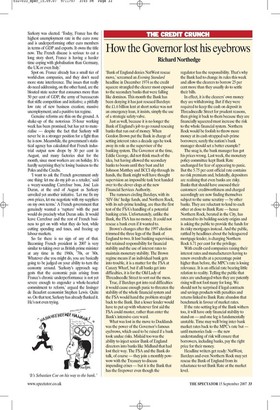How the Governor lost his eyebrows
Richard Northedge 'Bank of England denies NatWest rescue move,' screamed an Evening Standard headline in December 1974 as the credit squeeze strangled the clearer most exposed to the secondary banks that were falling like dominos. This month the Bank has been denying it has just rescued Barclays: the £1.6 billion lent at short notice was not an emergency loan, it insists, simply the use of a strategic safety valve.
Just as well, because it is no longer the Bank of England's job to go round rescuing banks that run out of money. When Gordon Brown put the Bank in charge of setting interest rates a decade ago he took away its role as the supervisor of the banking system. The Governor at the time, Eddie George, did not think much of the idea, but having allowed the secondary banks to boom until they bust and let Johnson Matthey and BCCI slip through its hands, the Bank might well have thought supervision an impossible task best handed over to the clever-clogs at the new Financial Services Authority.
The rumours circling Barclays, with its `SIV-lite' hedge funds, and Northern Rock, with its sub-prime lending, are thus the first test of the FSA's handling of a potential banking crisis. Unfortunately, unlike the Bank, the FSA has no money. It could not rescue a bank even if it wanted to.
Brown's changes after the 1997 election trimmed the three legs of the Bank of England to two. It lost banking supervision, but retained responsibility for financial stability and the use of interest rates to maintain monetary stability. The Brown regime means if an individual bank gets into trouble, it is a matter for the FSA at Canary Wharf, but if all banks get into difficulties, it is for the Old Lady of Threadneedle Street to sort out the mess.
True, if Barclays got into real difficulties it would cause enough panic to threaten the stability of the whole financial system and the FSA would hand the problem straight back to the Bank. But a lesser lender would have to put up with whatever first aid the FSA could muster, rather than enter the Bank's intensive-care ward.
What was lost in the move to Docklands was the power of the Governor's famous eyebrows, which used to be raised if a bank took undue risks. Mislaid too was the ability to inject senior Bank of England directors into banks like Midland that had lost their way. The FSA and the Bank do talk, of course — they join a monthly powwow with the Treasury to discuss impending crises — but it is the Bank that has the firepower even though the regulator has the responsibility. That's why the Bank had to change its rules this week and allow the clearers to borrow 25 per cent more than they usually do to settle their bills.
In effect, it is the clearers' own money they are withdrawing. But if they were required to keep the cash on deposit in Threadneedle Street for prudent reasons, then giving it back to them because they are financially squeezed must increase the risk to the whole financial system. Northern Rock would be foolish to throw more money at its cash-strapped sub-prime borrowers; surely the nation's bank manager should set a better example?
The snag is, the bank manager has got his prices wrong. Last week, the monetary policy committee kept Bank Rate unchanged for fear of appearing to panic. But the 5.75 per cent official rate contains no risk premium and, belatedly, depositors are realising that even banks are risky. Banks that should have assessed their customers' creditworthiness and charged accordingly are now finding themselves subject to the same scrutiny — by other banks. They are reluctant to lend to each other at close to Bank Rate — hence Northern Rock, berated in the City, has returned to its building-society origins and is asking the public to provide the funds for its risky mortgages instead. And the public, rattled by headlines about the beleaguered mortgage lender, is charging Northern Rock 6.71 per cent for the privilege.
With credit-card companies raising their interest rates and manufacturers having to renew overdrafts at a percentage point higher than before, the MPC's rate is losing relevance. It is an official rate bearing little relation to reality. Telling the public that rates are unchanged when they are patently rising will not fool many for long. We should not be surprised if legal contracts and savings products with penalties and returns linked to Bank Rate abandon that benchmark in favour of market rates.
If the rate-setting leg of the Bank withers too, it will have only financial stability to stand on — and one leg is fundamentally unstable. Time may well bring inter-bank market rates back to the MPC's rate but — until memories fade — the new understanding of risk will ensure that borrowers, including banks, pay the right price for their money.
Headline writers get ready: NatWest, Barclays and even Northern Rock may yet rescue the Bank of England from its reluctance to set Bank Rate at the market level.

























































 Previous page
Previous page